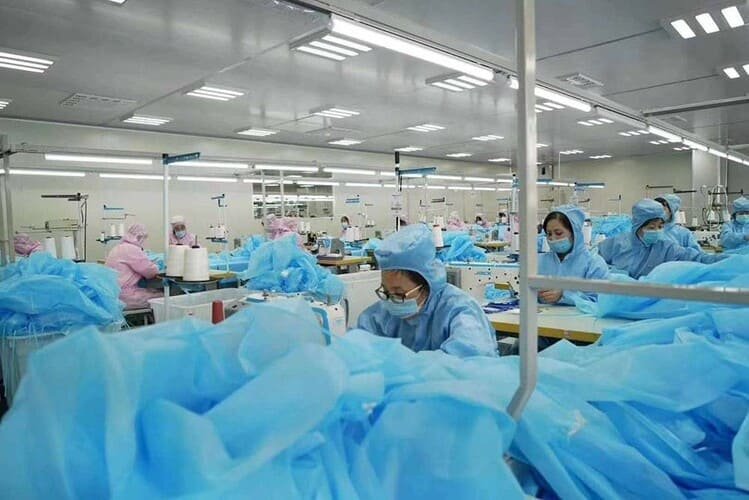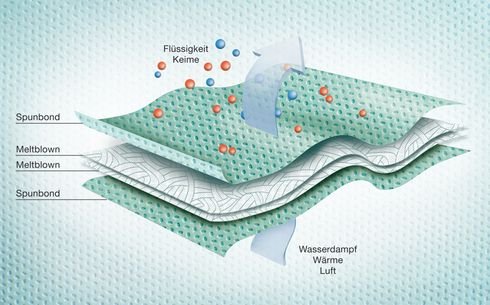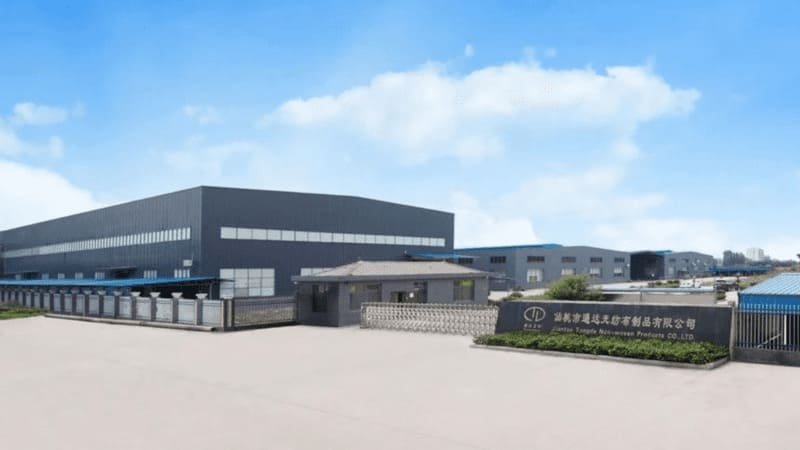Table of Contents
The PPE industry has experienced unprecedented growth, particularly since the global pandemic. (Yahoo Finance) However, this surge has raised environmental concerns, prompting a shift towards sustainable practices. (Science Direct)
Enter biodegradable isolation gowns – a game-changing innovation designed to protect both healthcare workers and the planet. Unlike traditional gowns made from synthetic materials like polypropylene and polyethylene, these eco-friendly alternatives break down naturally, significantly reducing waste. Sustainability in the PPE supply chain is becoming crucial as consumers and institutions prioritize green initiatives. (Tanner Pharma) An Isolation Gown Factory embracing sustainable practices can meet regulatory standards while appealing to a broader, eco-conscious market.
The environmental impact of traditional, non-biodegradable PPE is staggering. During the pandemic’s peak, an estimated 1.6 million tons of PPE waste was generated daily. This alarming statistic underscores the urgent need for sustainable alternatives in the isolation gown industry. (Plastics Today)

Factors driving the demand for sustainable PPE
Increased Environmental Awareness
Consumer demand for sustainable practices has surged, with 78% of consumers preferring environmentally responsible companies (2021 survey). This has pushed isolation gown factories to adopt eco-friendly production methods and materials, significantly reducing their carbon footprint.
Regulatory Changes and Government Initiatives
Government regulations, such as the EU’s Green Deal aiming for climate neutrality by 2050, have mandated stricter environmental standards for medical textiles. In response, many isolation gown factories have upgraded their facilities to minimize waste and energy consumption, ensuring compliance and enhancing customer trust.
Corporate Responsibility and Green Certifications
Isolation gown factories are increasingly seeking green certifications like ISO 14001 and OEKO-TEX Standard 100 to demonstrate their commitment to sustainability. For example, Medline Industries recently received ISO 14001 certification, boosting its market position and aligning with growing consumer demand for ethical and sustainable products.
Biodegradable materials that disposable isolation gowns factories choose
The shift towards sustainability in isolation gown manufacturing has led to the adoption of innovative biodegradable materials. Two prominent examples are:

Derived from renewable resources such as corn starch or sugarcane, has emerged as a sustainable alternative in isolation gown production. This material offers several advantages:
- Natural decomposition in composting conditions
- Suitable durability for short-term use in healthcare settings
- Reduced environmental impact compared to traditional synthetic materials

Produced through microbial fermentation, represents another significant advancement in biodegradable materials. Its key features include:
- Biodegradability and biocompatibility
- Optimal balance between flexibility and strength
- Potential for customization to meet specific isolation gown requirements
These materials demonstrate the potential for isolation gown factories to meet both performance and sustainability goals in their product offerings.

Switching to biodegradable materials offers several advantages over traditional plastics and nonwoven materials, like polyethylene, and polypropylene:
- Environmental Impact: Traditional materials can take hundreds of years to break down. In contrast, materials like PLA and PHA decompose much faster, reducing the environmental footprint. (VEnvirotech)
- Sustainability: These biodegradable materials are often made from renewable resources, which means they’re not contributing to the depletion of finite fossil fuels.
- Health and Safety: Biodegradable materials are generally free from harmful chemicals, making them safer for both healthcare workers and patients.
By opting for biodegradable materials, an Isolation Gown Factory can not only meet eco-friendly standards but also contribute positively to public health and the environment.

Advantages of Sourcing from a Biodegradable Isolation Gown Factory
Sustainable isolation gown factories are making significant strides toward environmental stewardship through several key initiatives:
- Waste Reduction
Advanced production techniques, such as precise cutting technology, minimize material waste. This approach not only reduces landfill contributions but also improves cost-efficiency by maximizing fabric utilization. - Lower Carbon Footprint
By adopting renewable energy sources like solar or wind power, factories are decreasing their reliance on fossil fuels. Efficient logistics systems further minimize emissions throughout the supply chain, enhancing the factory’s eco-friendly reputation. - Resource Conservation
Water-saving technologies and recycling programs are at the forefront of sustainable manufacturing. Some factories implement closed-loop water systems, significantly reducing water consumption and operational costs.
These efforts not only contribute to environmental preservation but also result in cost savings and improved brand image, demonstrating that sustainability in isolation gown production is both ecologically responsible and economically beneficial.
Economic advantages
1. Cost Reduction Through Efficient Waste Management
Sustainable practices in isolation gown factories can significantly reduce waste management costs, which typically account for up to 10% of production budgets. Implementing recycling methods, utilizing reusable materials, and improving quality control can lead to substantial savings. Additionally, waste-to-energy technologies can convert waste into usable energy, potentially creating a new revenue stream.
2. Government Incentives and Subsidies
Many governments offer financial incentives for sustainable business practices. For example, the U.S. federal government provides grants of up to $200,000 for implementing green technologies. Tax credits for sustainable materials and methods further reduce operational costs, making sustainability both environmentally and economically beneficial.
Industry Leaders of Biodegradable Isolation Gown Manufacturers
In the realm of isolation gown production, several companies have distinguished themselves through their commitment to sustainability and innovation:

1. Medical Kingfa
Medical Kingfa produces biodegradable disposable isolation gowns made of PBAT film laminate PLA biodegradable fabric. These gowns offer protection against airborne infections and pollutants and are suitable for various applications including food processing, manufacturing, general maintenance, and daily cleaning. The gowns are latex-free, water-repellent, lightweight, and environmentally friendly, with a degradation rate of 94% in 90 days. They meet standards such as ANSI/AAMI PB70: 2012 LEVEL 2 and EN 13795-1:2019.


2. Welmed
Welmed’s GoGreen biodegradable thumb loop isolation gowns are made of biodegradable polypropylene and are manufactured in the USA. These gowns are designed for non-surgical medical settings and decompose in 6 months in a landfill environment. They are latex-free and come in a case quantity of 100 each.
3. Precision Textiles
Precision Textiles offers EcoGuard material for disposable medical isolation gowns. This material contains an additive accelerates biodegradation to approximately six years, significantly faster than typical polypropylene gowns. EcoGuard gowns are suitable for applications ranging from AAMI Level 1 to Level 4 and comply with the Berry Amendment, ensuring they are made in the USA.
These industry leaders exemplify how combining high-quality products with sustainable practices can drive positive change in the isolation gown sector, paving the way for a more environmentally responsible future in healthcare manufacturing.
Key Considerations Selecting a Biodegradable Isolation Gown Factory
When choosing a sustainable isolation gown factory, consider these crucial factors:
- Certifications and Eco-labels Look for certifications like ISO 13485 and eco-labels such as OEKO-TEX® Standard 100, which ensure quality, safety, and environmental compliance.
- Manufacturing Processes and Materials Evaluate the use of advanced techniques like ultrasonic sewing and automation and the quality of raw materials used.
- Supply Chain Transparency Prioritize factories with transparent supply chains that can trace components from source to finished product.
Challenges and Future Outlook of Biodegradable Isolation Gowns
Current challenges:
- Production Costs: Material expenses can account for up to 60% of total production costs, while labor costs for a 100-worker factory can reach $1 million annually.
- Supply Chain Limitations: Raw material shortages and shipping delays, exacerbated during the COVID-19 pandemic, can lead to production interruptions and increased costs. (PMCID: PMC8776498)
Future trends and innovations:
- Technological Advancements: Automation and IoT integration are revolutionizing production efficiency and quality control. Advanced machinery can halve production time and ensure precision, while smart sensors detect flaws early in the process.
- Policy Changes: Stricter global regulations, such as the EU’s 2023 PPE standards, are driving manufacturers towards sustainable practices. Compliance not only ensures market access but also appeals to eco-conscious buyers, potentially expanding global market reach for compliant factories.

The rise of biodegradable isolation gown factories marks a pivotal shift in the PPE industry, successfully balancing environmental stewardship with crucial safety requirements. These innovative facilities are spearheading waste reduction and promoting a circular economy without compromising on protection. Recent studies highlight a growing preference for biodegradable PPE in healthcare settings, with some hospitals reporting a remarkable 30% decrease in annual waste. As the industry continues to invest in research and development, we can anticipate further advancements in material durability and comfort while maintaining biodegradability, paving the way for a more sustainable future in healthcare.
Ready to embrace sustainable PPE solutions? Contact info@morntrip.com today for your biodegradable isolation gown needs. Our factory specializes in producing high-quality, eco-friendly gowns that not only meet rigorous safety standards but also minimize environmental impact. Let’s collaborate to protect your team and the planet simultaneously. Reach out now to discuss your specific requirements and discover how our biodegradable gowns can benefit your organization. Take the first step towards a greener, safer future in healthcare by partnering with us for your isolation gown sourcing.




